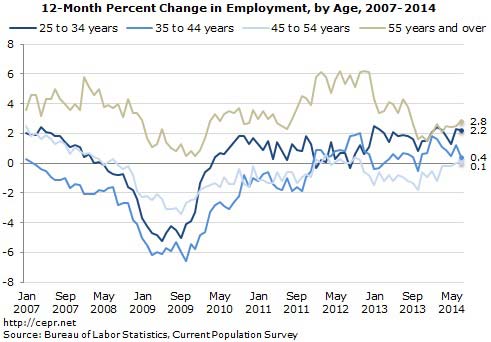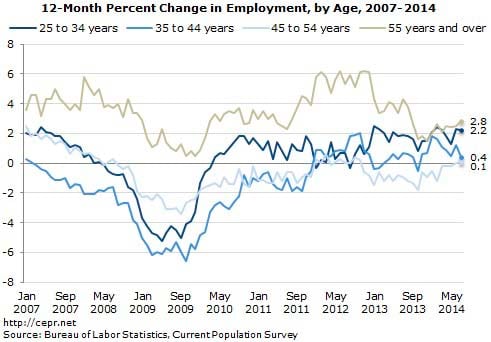
Support justice-driven, accurate and transparent news — make a quick donation to Truthout today!
Wage growth slowed slightly in the last quarter to 1.8 percent from 2.0 percent in the last year.
The economy added 209,000 jobs in July, a sharp slowing from its 277,000 average over the prior three months. The slowdown was widely spread across sectors, although temporary help — which added just 8,500 jobs — and health care — which added just 7,000 — were notably weak. Construction — which added 22,000 jobs — and manufacturing — which added 28,000 jobs — were surprisingly strong.
The unemployment rate was essentially unchanged at 6.2 percent, as there was little change in either the size of the labor force or the number of unemployed. Involuntary part-time employment edged down slightly, reversing part of a jump in June. It is now 669,000 below its year-ago level. Voluntary part-time employment decreased modestly, but is still 502,000 above its year-ago level. This would be consistent with some workers opting to work part-time now that they no longer need to get health insurance through their job as a result of the Affordable Care Act.
There was little change in employment or unemployment rates for most demographic groups, although the employment-to-population ratio for African Americans edged up to 54.6 percent — its highest level since January of 2009. Workers over age 55 accounted for all the reported employment growth in July, with an increase in employment of 159,000 compared to 131,000 overall. However, their 43.4 percent share of employment growth over the last year is considerably less than it had been earlier in the recovery.

The duration measures showed little change, with average duration of unemployment falling back 1.1 weeks to 32.4 weeks, while both the median duration and share of long-term unemployed increased slightly. The share of unemployment due to people voluntarily quitting their jobs was essentially unchanged from the prior two months at 8.9 percent. This is up from 8.5 percent last July, but still well below the 11-12 percent shares in the years before the downturn.
In the establishment survey, the goods-producing sector was surprisingly strong, adding 58,000 jobs. However, the pace of growth is likely to slow in the month ahead. The 22,000 job growth reported in construction is likely faster than can be supported by the modest pace of spending growth in the sector. The 28,000 rise in manufacturing employment was driven largely by a 14,600 increase in jobs in the auto industry. This, in turn, was likely due in part to the timing of shutdowns for retooling and will be partially reversed next month. The average workweek actually fell in manufacturing and the one-month diffusion index plunged from 63.0 to 53.7, so we are likely to see weaker growth going forward. Nonetheless, it is worth noting that employment in the auto sector reached its highest level since July, 2008.
In contrast to autos, jobs in the motion picture industry continue to disappear. They fell 3,500 in July and are down by 56,300 (15.7 percent) over the last year. The temp sector also showed weakness, adding just 8,500 jobs, compared to an average of 17,000 over the last year. Similarly, health care added just 7,000 jobs, down from an average of 19,000 over the last year. A high-side anomaly in the July data was a jump in employment in private social assistance of 18,400. This is certain to be reversed, at least partially, in coming months.
This report provides little evidence of any pick-up in wage growth. The average hourly wage rose at a 1.82 percent annual rate over the last three months compared with the prior three months. This compares to a 2.0 percent increase over the last year. While a tightening labor market should eventually allow workers to see some gains in real wages, the economy does not appear to be at this point yet.
Overall, this should be seen as a modestly positive report. The slower pace of job growth is not surprising given how out of line recent job growth has been with the modest GDP growth we have been seeing. (First half growth averaged 1.0 percent.) It is likely that future months will see weaker growth as manufacturing and construction will see slower job gains. We are still far from the point where the labor market is strong enough that workers will be able to get wage gains in line with economic growth.
Press freedom is under attack
As Trump cracks down on political speech, independent media is increasingly necessary.
Truthout produces reporting you won’t see in the mainstream: journalism from the frontlines of global conflict, interviews with grassroots movement leaders, high-quality legal analysis and more.
Our work is possible thanks to reader support. Help Truthout catalyze change and social justice — make a tax-deductible monthly or one-time donation today.